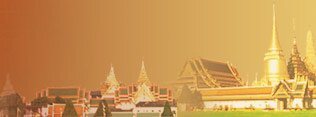 |
|
 |
 |
 |
|
 |
 |
 |
|
 |
ISCAS 2003 Bangkok
Forum Sessions |
Each of the three main conference days will be concluded with a forum session where several invited experts and the audience discuss a hot topic. All three topics touch social aspects of the technologies presented at ISCAS.
Forum I on Monday is about the Circuits and Systems Society itself, and whether it can maintain (or re-gain) the pioneering role that it historically played in the development of circuits and systems.
Forum II on Tuesday is about the social implications of communication technology, particularly in connection with globalisation, and about the role engineers will play in overcoming a purely economy-driven globalisation.
Forum III on Wednesday is about the role of the electrical engineering departments, many of which have already changed their name, and how EE education should be adapted to provide a good education of the `hi tech electrical engineer' of the future.
The forum discussions are plenary 70-minute events at the end of the daily session programme. Drinks will be served in front of the forum room. We are looking forward to welcoming all ISCAS participants at the forums.
George S. Moschytz
Hanspeter Schmid
Forum Moderators
|
|
MONDAY, 26 May 2003
16.50pm - 18.00pm
Room: Imperial Queen's Park I-II
CASS, Quo Vadis? |
By its very nature, the IEEE Circuits and Systems Society has had to adapt to the breathtaking rate of change in the technology of circuits and systems in the last few decades. With the new era of nano-technology, molecular electronics, information technology, etc, this rapid change shows no signs of letting up. At the same time the CAS Society seems recently to have been more concerned with its internal structure and organization than with the question of maintaining the pioneering role that it has historically played in the development of circuits and systems. This makes one wonder as to where our Society is going: Quo Vadis? A panel of former CAS presidents and other outstanding exponents of the CAS Society will confront these questions in this forum and attempt, while interacting with the audience, to formulate a vision for the future of our CAS Society.
Moderator: George S. Moschytz, Head of the Electrical and Computer
Engineering Dept., Bar Ilan University, Israel
Panelists: John Choma
Giovanni De Micheli
Chris Toumazou
Eby Friedman
Mona Zaghloul
Ruey-Wen Liu
Orly Yadid-Pecht
Michael Lightner
|
|
TUESDAY, 27 May 2003
16.50pm - 18.00pm
Room: Imperial Queen's Park I-II
How technology drives both globalisation and helps anti-globalisers |
Globalisation is one of the central problems of our time. Huge companies have become global players so quickly that political organisations could scarcely keep up with the pace. Only it is mainly wealthy people in well-developed countries who get at least some short-time profit from this. There are many governments and non-governamental organisations (NGOs) who counteract this form of globalisation in a constructive way (by creating global structures for the benefit of poor people and less developed countries) or a destructive way (by fighting globalised companies). Communication technology plays a central role in all this: it made the complete globalisation of companies possible in the first place, it is produced mainly by globalised companies, and it is an important tool for many anti-globalisers. In the past few hundred years, the liberation of people from oppressive nation states and churches was accompanied by the rise of science and its will for objectivity. It may well be that engineering and its striving for concrete and clear solutions will play the same role in the struggle for liberation from a globalised economy. In this forum, we will discuss the ambivalence of communication technology and the role that engineering (electrical, software, biological, ...) has to play in the future.
Moderator: Hanspeter Schmid, Analog IC Designer, Bernafon AG, Bern,
Switzerland.
Panelists: Yehuda Elkana, Professor of Philosophy, Head of the Central
European University, Budapest, Hungary.
Veikko Porra, Institute of Digital Communication,
Helsinki University of Technology, Finland.
Richard Stallman, President, Free Software Foundation.
Tuna B. Tarim, Wireless Design Engineer, Customer Owned
Tooling (COT), Texas Instruments, Inc., Dallas, TX
|
|
WEDNESDAY, 28 May 2003
16.50pm - 18.00pm
Room: Imperial Queen's Park I-II
Schroedinger vs. Kirchhoff:
Is the EE Department (and Circuits and Systems) Obsolete? |
In the New York Times we read recently `Most electrical engineers say that silicon transistor technology has at most another decade before it runs into fundamental laws of physics that will prevent further miniaturization.' Many EE departments are changing their name, and some their curriculum, in an effort to `make them more timely.' To many, `electrical engineering' implies electrical machines and power distribution systems. So is the EE department, as we know it, on its way out? In light of `Molecular Electronics,' `Nano-Technology,' Quantum Signal Processing, and so many other breathtaking developments, should we be overhauling our old EE curriculum to be prepared for the changes that are sure to come in but a few years? A Forum of eminent EE professors, department heads, and researchers will present their opinions on these questions and attempt, with interaction from the audience, to provide guidelines for the education of the `hi tech electrical engineer' of the future.
Moderator: George S. Moschytz, Head of the Electrical and Computer
Engineering Dept., Bar Ilan University, Israel
Panelists: Len Bruton
Leon Chua
Yih-Fang Huang
Ken Jenkins
Ken Laker
Josef A. Nossek
Sitthichai Pookaiyaudom
|
|
ISCAS 2003 : Bangkok - Thailand
2003 IEEE International Symposium on Circuits and Systems
Sunday May 25 - Wednesday May 28, 2003
Imperial Queen's Park Hotel, Bangkok, Thailand
|
  
|
Related Conference Websites:
ISCAS 2004
Contact Us
Should you have comments or suggestions please drop us an e-mail at
|
Designed & Developed by Maxcyber ®
|
|
|



